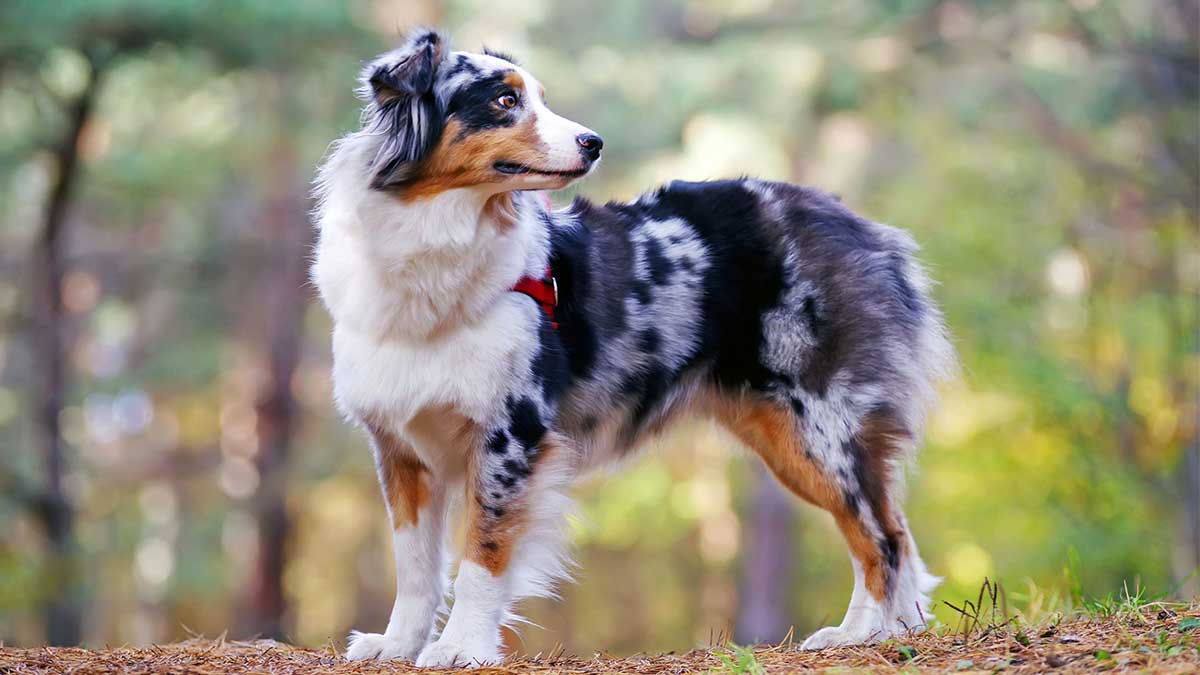Australian Shepherds (Aussies) are loyal, friendly, responsible and active dogs. Representatives of the breed are highly trainable and have a cheerful disposition. For a healthy life, they certainly need outdoor games, plenty of space and, of course, a well-chosen diet.
Dry food VS natural food: which is better for the Australian Shepherd?
Veterinarians say that in the Australian shepherd diet, feeding high quality dry food and natural plant and animal products will be acceptable.
When choosing dry pet food, trust first and foremost trusted brands that offer balanced, safe and healthy products. Food should be chosen taking into account the weight and age of the dog. It is advisable to specify what type of food the breeder used. Another important point is that when feeding dry food, it is important to provide the dog with plenty of clean water, since such a diet causes increased thirst in animals.
Natural food can also be given to Australian Shepherds, but it must be food specially prepared for the dog. Important healthy foods for your pet include lean meat, cottage cheese, fish, and vegetables, as well as grains in small amounts. If you decide to cook food for your pet yourself, try to ensure that its diet is varied and balanced, and also remember the taboos associated with the nutrition of this breed.

Feeding Australian shepherd puppies
The content of Australian Shepherd puppies, especially their diet, is a separate matter. There are specialized dry foods for puppies, which take into account all the features of an incompletely formed organism.
The norms for feeding puppies with dry food are shown in the table:
| Age of puppy (months) | 1-2 | 2-4 | 4-6 | 6-10 | Over 10 |
| Number of feedings per day | 5-6 | 4-5 | 3-4 | 3 | 2 |
If you want to feed your Australian Shepherd puppy “naturally”, make sure that animal products (meat, fish, dairy products, eggs) represent at least 50% of the total diet. It is also important that plant products (vegetables and cereals) do not exceed one third of the total amount of food given to the puppy, since excess is fraught with obesity.
Another important part of nutrition for small Australian Shepherds is vitamin and mineral supplements. Consider including them in your diet even if you feed your puppies a balanced dry food.
It is also recommended to feed the puppy for the first two weeks exactly as the breeder did. A sudden change in nutrition can hurt a weak stomach, so introduce new foods gradually.
For Australian Shepherd puppies, when feeding, you should follow a few recommendations:
- After eating, the dog must rest for at least one hour (excluding major physical exertion during this period);
- The consistency of natural products should resemble thick sour cream;
- If the puppy does not eat food within 15 minutes, it is worth removing it;
- You cannot pour dry food into the bowl all day;
- Natural foods should be warm, but not hot;
- It is desirable to feed him at the same time.
It’s impossible to say unequivocally which is better for young and adult Aussies: natural products or dry food. The “natural” option will be optimal if you are ready to calculate the correct combination of proteins, fats and carbohydrates in the diet (the indicators change with age), as well as prepare separate foods specifically for the dog. If you do not have time for this, good dry food will be a worthy alternative, thanks to which you will be sure of your pet’s health.

Australian Shepherd Food: Rules and Regulations
It is worth familiarizing yourself with the prohibitions on feeding Australian Shepherds. These dogs absolutely should not eat:
- Dishes from the master’s table;
- Chocolate;
- Tubular bones;
- Smoked meats;
- Candy;
- Pork in all its forms;
- Raw eggs (boiled can be given occasionally).
It is also desirable to exclude bread, in extreme cases – to reduce its consumption to a minimum.
Keep track of a particular dog’s individual food tolerance. For example, some Australian Shepherds are allergic to chicken.
Regarding food standards, for adult Australian Shepherds, the daily nutrient requirements per 1 kg of weight (you will need to multiply by your dog’s weight) have the following indicators:
- Carbohydrates – 10g;
- Fats – 1.32g;
- Protein – 4.5g.
In the volume of feed for young animals, carbohydrate indicators should be multiplied by 1.5, and fat and protein – by 2. In addition, when choosing feed volumes, it is important to take into account the presence and duration of daily physical activity, coat density, and current air temperature.
When choosing ready-made food for Australian Shepherds, pay attention to the following nuances:
- Representatives of this breed consume a lot of energy every day, so it is advisable to choose foods marked “Active” for them;
- Looking at the labels on the packaging, make sure that the composition contains at least 32% protein;
- Australian shepherd puppies should be fed up to 4 times a day in medium portions;
- Adult Australian Shepherds should be fed twice a day;
- It is necessary to transfer young dogs to “adult” standards when they are one year old;
- In winter, you can add more fat to the dog’s diet: this will allow him to withstand the cold more easily;
- Overfeeding pets (especially during the growth period) is dangerous, as muscles and skeleton may not form properly;
- The dog should not have constant snacks between meals, and if you really want to please your pet, it is allowed to give him a piece of carrot or apple;
- As mentioned earlier, Aussies need plenty of clean water (especially when fed dry food), and the water in the bowl should not be refilled, but completely replaced with new water own.
It is important to understand that there is no completely universal nutritional formula, even for a particular breed. Be sure to consider the dog’s weight, load, lifestyle (eg Aussies can be service dogs), age, health issues. Therefore, it is advisable to consult veterinarians in order to understand exactly what your pet needs.


